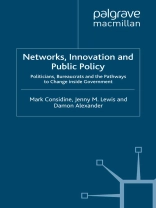This book examines the different normative approaches politicians, bureaucrats and community actors use to frame the innovation puzzle, arguing that these create specific cultures of innovation. The authors explore the role of formal institutions and informal networks in promoting and impeding governmental innovation.
Jadual kandungan
PART I: INNOVATION AS IDEAS WITHIN INSTITUTIONS Innovation, Government and Networks Innovation and Public Policy Networks as Interactions and Structures Networks and Key Actors PART II: INNOVATION INSIDE GOVERNMENT Introduction City of Parkside: Big Bang Meets Executive Coordination City of Kilbourne: Innovation from the Middle Out City of Melville: Incrementalists Rule City of Millside: Small World Meets Political Affiliation Who are the Innovators Inside Government?
Mengenai Pengarang
MARK CONSIDINE is the Dean of the Faculty of Arts at the University of Melbourne, Australia, and former Director of the Centre for Public Policy. He is a past winner of American Educational Research Association’s Outstanding Publication Award and in 2001 received the Marshall E. Dimmock Award for the best lead article in
Public Administration Review (with co-author Jenny Lewis). His latest book (with Sylvain Giguere) is
The Theory and Practice of Local Governance and Economic Development.
JENNY M. LEWIS is Associate Professor in Public Policy in the School of Social and Political Sciences, University of Melbourne, Australia. She received the American Society for Public Administration’s Marshall E. Dimmock Award in 2000 (with co-author Mark Considine) for the best lead article in
Public Administration Review. Her most recent book is
Health Policy and Politics: Networks, Ideas and Power.
DAMON ALEXANDER completed his Ph D at Monash University in 2006 and is employed as a Research Fellow in the School of Social and Political Sciences at the University of Melbourne, Australia. His research interests include social network analysis; network governance and community engagement; rural politics; and right-wing extremism.












